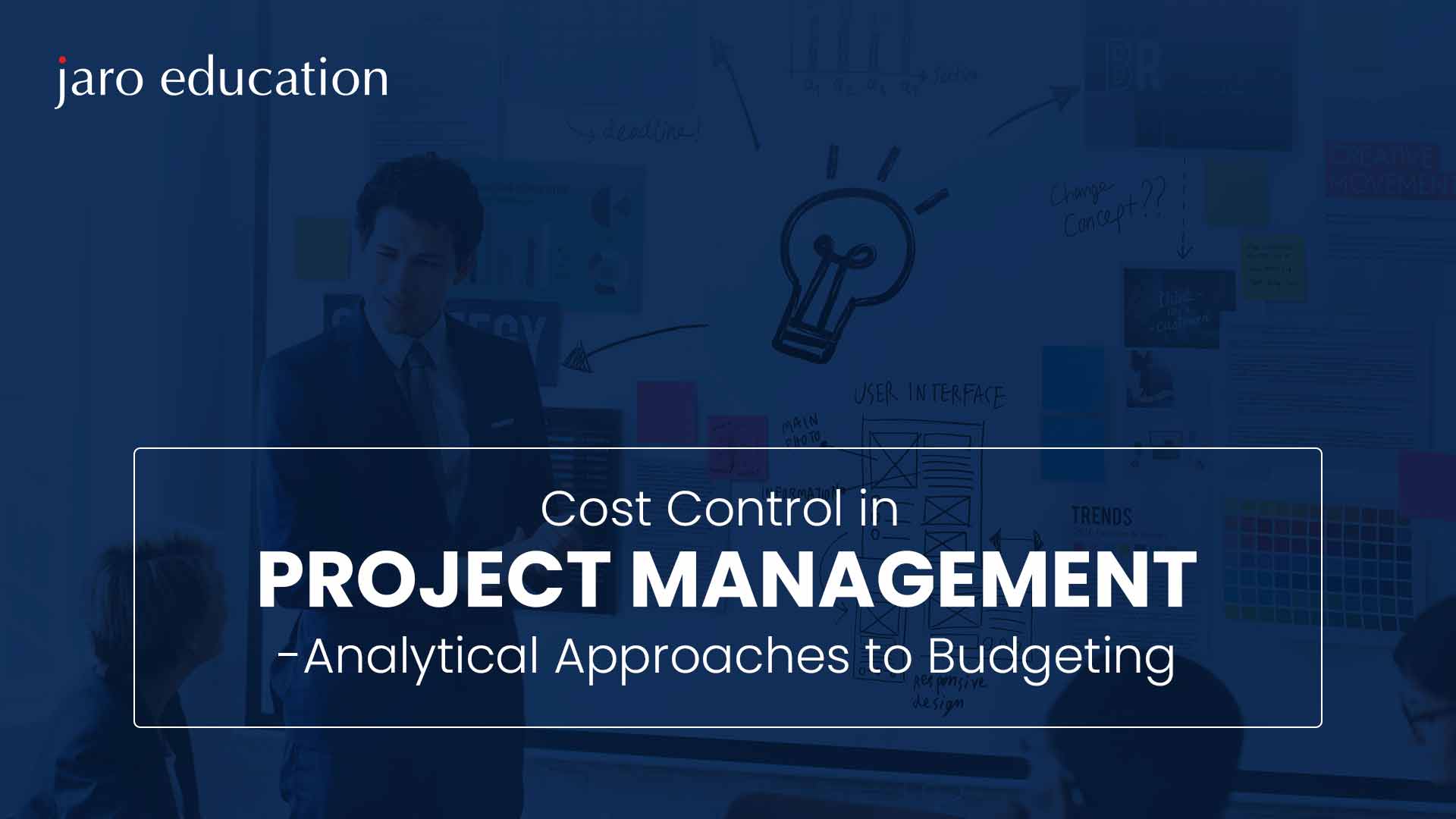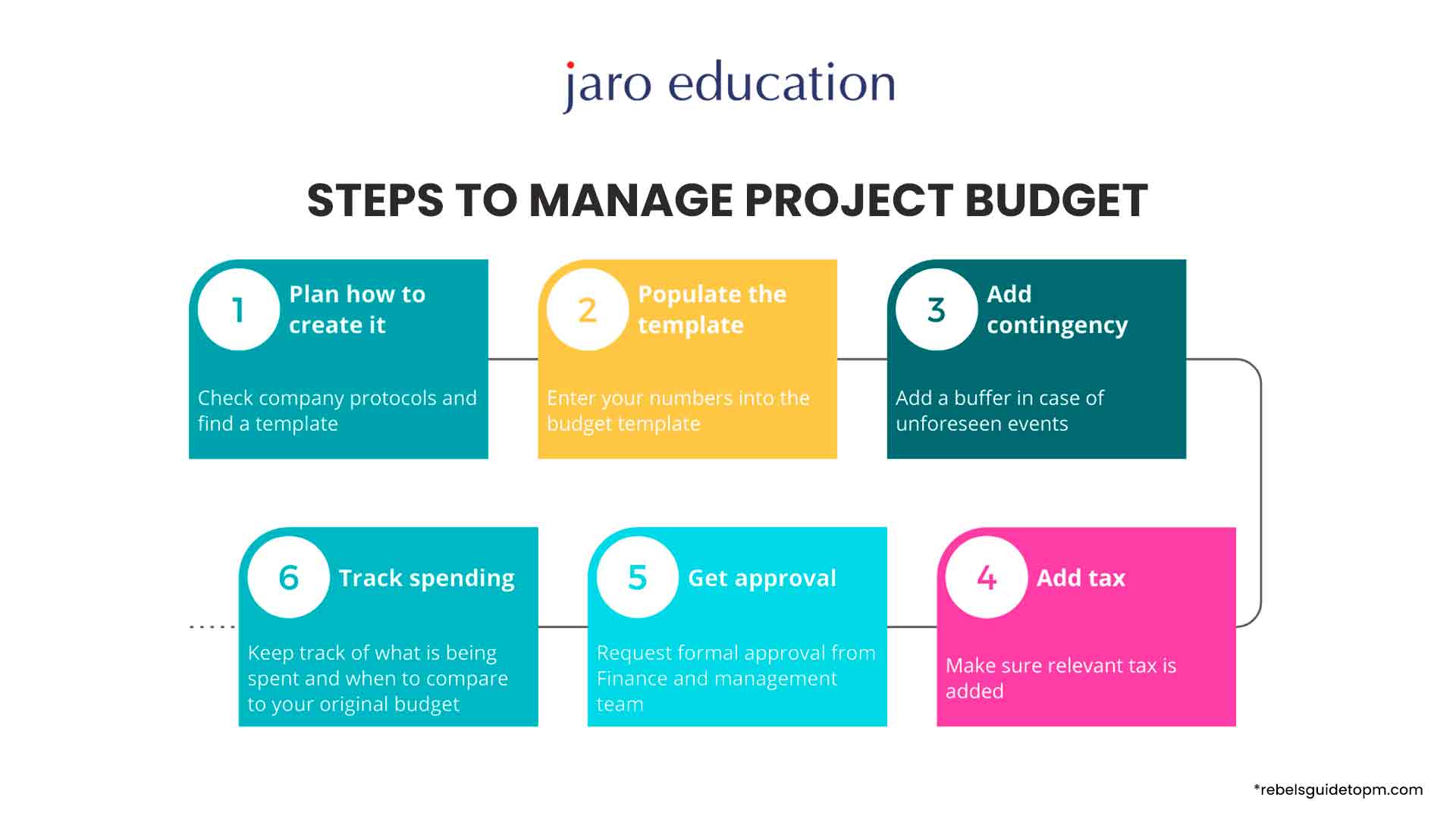Cost Control in Project Management: Analytical Approaches to Budgeting
Table of Contents

- jaro education
- 24, October 2023
- 4:00 pm
Project management functions as a road plan for completing tasks. It all comes around to developing a strategy, executing the job, keeping an eye on things, and then neatly closing it up. One important aspect of project management is keeping an eye on the budget, which we term as “cost control.”
Cost control is similar to keeping an eye on your wallet. When working on a project, one has to avoid spending too much money. It’s critical since overspending can lead to difficulties. If you keep your expenses in check, you may ensure quality work, satisfy your clients, and even earn a profit. Cost-cutting efforts are divided into numerous stages. First, you must develop a budget, simply a spending plan. Then, you develop a strategy, calculate the expenses, and keep track of the money as the project moves forward. Then, you estimate and write about how much money you will spend in the future. If expenses begin to exceed budget, you step in to set things right.
Managing costs in project management can be challenging because it requires special skills to execute. To help with this, IIM Mumbai has designed the Executive Certificate Program in Advanced Project Management and Analytics. This program is for people who want to enhance their skills in managing projects and can keep them on track regarding time, money, and quality. It covers a lot of important project management aspects like planning, scheduling, budgeting, handling risks, and quality maintenance, aiming to equip participants with today’s skills and knowledge to handle complex projects successfully.
What is Budgeting in Project Management?
Calculating how much material and money you will need for a project is known as budgeting. It helps you decide what the project will include, how long it will take, and how much it will cost. This planning also enables you to monitor how well the project develops concerning your initial plan.

A budget may be constructed in several ways. Begin with the big picture and work your way down, or begin with the most minor details and sum them all up. Look at prior project data, talk with experts, and do some calculations to determine costs. These tactics can help determine how much money you will need for the project.
Why is Budgeting Important in Project Management?
Budgeting is essential in project management for several reasons:
Setting Realistic Goals
It assists in determining feasible project goals, so that everyone involved will know exactly what has to be done, when it needs to be done, and how much it will cost.
Expense Tracking
Budgeting maintains a careful eye on the project’s expenses. This in turn, helps the project managers to compare what they intend to spend vs what they really spent. If things start to go off the rails, they will be able to catch it and correct it.
Improving Performance
Budgeting is about more than simply money; it is also about ensuring that the project operates smoothly. It enables managers to assess project procedures and outcomes’ efficiently and successfully, so that they can make modifications and enhancements if they find areas of improvement.
Analytical Approaches to Budgeting in Project Management
Analytical budgeting methods are similar to utilising maths and formulae to determine how many items and money a project needs. These methods are quite beneficial since they provide reliable and dependable data for budgeting and also reduce the uncertainty and risk associated with budgeting.
Let’s have a look at some of the analytical techniques that are employed in project management:
Earned Value Management (EVM)
EVM functions similarly to a project report card. It compiles information on what is intended to accomplish, how much it should cost, and what is already being done. It provides figures to determine whether or not the project is on the right track. If it isn’t, EVM can help to forecast how it will perform in the future.
Variance Analysis
Variance analysis is the process of comparing what we expect to happen in a project to what actually transpired. If there are disparities, we can better understand why they arose and what we should do about them, with the help of it.
Change Management
Projects occasionally veer off course. Change management assists in dealing with these changes. It enables the managers to understand how these changes affect the scope, scheduling, cost, and quality of our project. It also guarantees that the modifications are implemented in an orderly manner, with the necessary documentation and approvals.
How can Analytical Approaches Help in Cost Control in Project Management?
Analytical approaches can be quite beneficial when it comes to managing project expenditures. Here’s how they can assist:
Accuracy and dependability
Analytical approaches ensure that the budget is as precise as feasible. They aid in reducing errors and biases when determining how much money and resources are required. They also assist in budgeting for unanticipated expenses.
Visibility and Transparency
Analytical aspects provide real-time and trustworthy budget information, which means that one can share budget-related information with everyone participating in the project so that all are aware of the project updates.
Monitoring and control
Analytical approach assists in keeping track of spending. We can observe if we’re on track or if things deviate from the plan. If there are any issues, we will be able to identify them and resolve them quickly with the help of it.
Decision-Making
Analytical tools assist in making wise budgetary decisions. They allow managers to study and comprehend budget-related data. So, if there are any concerns or challenges, it helps to come up with solutions.
Budgeting and Cost Control in Project Management: Challenges and Solutions
To keep things running smoothly, project management mainly relies on planning and expense control. They assist in determining how much material and money we will require for a project and ensuring that the managers spend it wisely. However, project managers confront a number of obstacles, particularly when the team is dispersed or combines in-person and remote work. Some of these challenges are:
Managing Project Changes
Consider projects to be puzzles with moving components. These moving components that can be called as modifications, can have an impact on what the project is all about, how long it takes, and how much it costs. When the team is dispersed, it might be difficult to ensure that everyone is aware of the changes and its impact on the budget. The key to resolving the problem is clear communication.
Inaccuracies in Reporting
Consider attempting to follow a map with incorrect instructions. Accurate reporting is like a good map for projects, but it might take an astray when the data is incorrect. Thus, it is critical to ensure that everyone receives the correct information, especially when they are not all in the same location.
Forecasting Difficulties
It’s a little like predicting the weather; sometimes it’s spot on, and sometimes it’s way off. Forecasting helps us forecast what will happen in the project, but it can be difficult to create good predictions when things are constantly changing.
Procurement Difficulties
Consider this like online shopping for your project; you want the best product at the best price. When your team is dispersed, finding the proper vendors and getting things done on schedule can be like looking for a needle in a haystack. Smart tactics such as strategic sourcing and effective contract management can thus be beneficial.
Resource Allocation Issues
Effective resource allocation is akin to putting together a jigsaw puzzle. It is easy to have too many or too few pieces in the wrong places. So, resource management methods and tactics such as resource levelling, smoothing, optimisation, and scheduling are used by project managers to address this issue. However, balancing resource demand across many projects is a juggling act that requires meticulous preparation.
Managing Stakeholder Expectations
Think of stakeholders as individuals with different expectations for a project. Managing these many needs may be difficult, especially when they don’t make sense, are unclear, or clash with one another. So, throughout the project, project managers must communicate with various stakeholders to ensure they all understand what the project is about. In this manner, everyone’s expectations will align with what the project is capable of.
Dealing with Scope Creep
Scope creep is like planning a modest garden and then discovering that it has grown into a massive forest. This uncontrolled expansion might result in more efforts and high expenses. To avoid this, project managers must be very explicit about what the project will and will not do. They also require a solid mechanism for authorising and recording modifications to the project’s plans, particularly when they influence the budget.
Handling Risks and Uncertainties
Consider project risks like unexpected storms during a picnic. They have the potential to ruin the enjoyment! Similarly, project managers must identify, investigate, and prioritise these risks before devising strategies to address them, like having a contingency plan in case it rains. In this manner, the project may continue to advance even if unforeseen events occur.
Thus, if you want to learn more about how to reduce costs in project management and apply advanced analytic approaches to make your project a success, you should consider enrolling in IIM Mumbai’s Executive Certificate Programme in Advanced Project Management and Analytics. This online programme entails a period of 7 to 8 months and allows you to learn at your own pace. It is especially designed for those wanting to effectively manage projects as well as keeping them on track in terms of time, money, and quality by utilising sophisticated analytic tools. Additionally, this programme offers you the opportunity to interact with knowledgeable individuals from academia and industry, study on campus for 3 days, and even work on real-life industry projects. Register with Jaro Education to learn more about this programme and get started soon.









2 thoughts on “Cost Control in Project Management: Analytical Approaches to Budgeting”
Thank you for your sharing. I am worried that I lack creative ideas. It is your article that makes me full of hope. Thank you. But, I have a question, can you help me?
We’re glad to hear that our article has been inspiring! Feel free to ask any questions you have; we’re here to help.